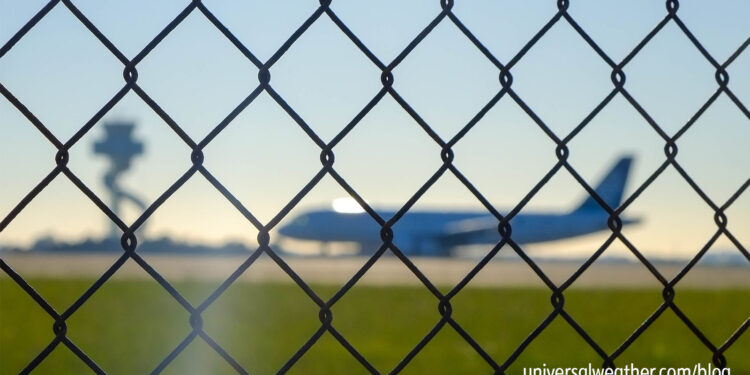Assessing Airport and Aircraft Security – Part 1: Top Considerations

This business aviation blog post is part of a series on airport security options.
Airport and aircraft security must always be top of mind, particularly when traveling to unfamiliar airport locations. Depending on the airport, different options and services will be available ranging from simple security considerations to more involved arrangements. It’s always best to work with your ground handler and trip support provider to understand all airport security considerations and options in advance of travel.
The following is an overview of what you need to know:
1. Security requirements depend upon your type of trip
Aircraft security becomes an especially important consideration when your passengers, company, or business product may attract unwanted attention at destination. For example, this could be the case if you have a well-known international celebrity or business executive onboard or are traveling for religious purposes to a region with differing religions. In such cases aircraft security may be an essential consideration in destination security planning.
2. Ground handler assistance
At many airports ground handlers and fixed-base operator (FBO) personnel will meet, greet and assist passengers through the airport to ensure that they are secure on the airport property. Depending upon the airport location, ground handler or FBO, this is a little-to-no cost service and helps to enhance security of both aircraft and personnel.
3. Airport and ramp security
Airport security normally takes the form of surveillance cameras and airport/ramp access controls. In most cases airport have roving patrols conducted by the governing airport authority. These personnel may be airport employees, police, or military personnel depending on the country, airport, and type of airfield. Airport patrols take different forms, depending if the airport is a civilian, military, or joint use facility. At military and joint use airfields it is not uncommon to see a military presence throughout the facility. It’s always important to know, prior to the day of operation, what sort of surveillance, patrols, and ground handler/FBO-provided security is offered at each destination. Your security and trip support providers will provide insight on these matters.
4. Airport fencing and parking areas
It’s important to determine possible vulnerabilities in airport fencing, as well as the location and security of general aviation (GA) parking areas. Particularly if the airport does not have surveillance cameras, adequate lighting or regular airside patrols, the condition of airport fencing can be especially critical. In India, for example, airport fencing may be inadequate, and it’s often recommended to obtain a full-time aircraft security guard.
5. Securing the aircraft in a hangar
A primary consideration when operating to airports away from home base is securing the aircraft as effectively as possible. Depending on your budget you may opt for hangar parking, to enhance security, but this will depend upon hangar availability. Some airports offer hangar accommodation for transient general aviation (GA) aircraft on a first-come-first-serve basis while others do not have hangarage available. A hangar will not only protect your aircraft from the elements but will make it less accessible to others. Depending on the hangar there may be enhanced access controls, 24/7 video surveillance cameras and logs of all who enter/leave the hangar. When arranging hangar parking, be sure to confirm all available security options.
6. Private security options
Lead time is important when considering privately arranged additional security for your aircraft. Some airports do not allow supplemental aircraft security, while others may allow this with restrictions – such as unarmed only aircraft guards. If you determine that you’d like to have personnel securing your aircraft on the ramp, and the airport allows supplemental security, there are many options to consider.
7. Airport and local area security briefs
Especially when traveling to new locations or destinations you’ve not been to recently, it’s good practice to obtain airport, local area, and hotel security briefs. These briefs provide valuable insights into what’s taking place (e.g., protests, strikes, etc.), as well as local security risks, so you’ll be able to better determine security services needed for your aircraft. Working with a security provider allows operators to focus holistically on securing aircraft, crew, and passengers. These security intelligence and planning actions are different in nature from just arranging general services for the aircraft. For example, due to increased airport security risks in Europe, we’re seeing more operators arrange aircraft security today than in the past.
Conclusion
There are certain airports – typically in high threat regions and areas where airport security is vulnerable – where supplemental aircraft security is always recommended. Best practice is to have a conversation with your trip support and security providers prior to any trip to new or potentially risky destinations.
Questions?
If you have any questions about this article or would like assistance in planning security for your next trip, contact me at traciecarwile@univ-wea.com.
Stay tuned for Part 2, which covers additional information on aircraft security options.




